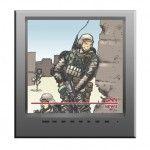Irish philosopher and statesman Edmund Burke said, “There is no safety for honest men except by believing all possible evil of evil men.” In Iraq, American soldiers face the most evil of men, who use every dirty trick they can think of to kill? These include hiding bombs on bodies of insurgent corpses, and feigning death only to shoot American soldiers when they come close enough to verify their status.
Recently, a videotape has circulated showing these situations. In the tape, a Marine decided not to take the chance of checking the body of a wounded insurgent, shooting him instead. Many are crying out against this decision, and the tape is being used as a tool to fuel hate against American forces and the war.
It’s important for rational individuals to look beyond a video to see the situation, rather than taking a moment out of context. War is about killing people, and, despite many people’s wishes, it cannot be anything else. The Marine in that video did nothing wrong in protecting his life and the life of his comrades by killing a potentially dangerous man, wounded or not.
The cameraman, Kevin Sites, admitted to the harsh conditions this unidentified Marine faced. “No one . . . would deny that a soldier or marine could legitimately err on the side of caution under those circumstances,” he said in an open letter on his Web site, www.kevinsites.net.
That Marine had reportedly been shot in the face the day before, and only a block away from the mosque in which the incident took place, a Marine was killed and five others wounded when a booby trap among wounded insurgents went off.
Any man living under those conditions should want to protect his safety against such an enemy. The insurgent laying on the floor, though wounded, was still a potential threat to his life.
Yet Sites, like others, has the wrong idea of values in that situation. “When the Iraqi man in the mosque posed a threat,” Sites wrote, “he was your enemy; when he was subdued he was your responsibility.” To say that any man who takes up arms to kill you and your comrades, healthy or wounded, is your burden is a repulsive insult to American soldiers.
While the American military has always pledged to fight with honor and chivalry, and treats wounded enemies and POW’s well, they are never an American responsibility. These insurgents have been using our good nature against us by booby trapping their wounded. Soldiers are free to choose whether to continue risking their lives to be gracious toward wounded insurgents, but if they choose to safeguard their lives by shooting them, as this Marine did, they are perfectly justified in doing so.
Critics of this idea are guilty of valuing the lives of our enemy over the lives of American soldiers, and are painting these actions are as inexcusable war crimes. “The fear and frustration factors cannot be considered mitigating,” Madeline Morris, a professor at Duke University Law School, told Reuters.
The fact that she could so easily discount the danger of urban warfare shows how clueless Morris is. David Perlmutter, a professor of mass communications at Louisiana State University and author of how images of war reach the public consciousness, believes this thinking is common among our generation because of our distance from past wars.
“The video lacked historical context,” Perlmutter told the Pittsburg Tribune-Review. “What sorts of battles have Americans fought over the years? What was the fighting like? Are there times when the enemy acts like he’s dead, then kills American soldiers? How can we condemn the Marines in Fallujah without also condemning the Greatest Generation for the way they fought wars and, if we were being honest with ourselves, the way everyone has fought wars throughout history?”
“We have two generations of Americans who have ideas about battle that come from TV and video games,” added Perlmutter. “Our schools have sanitized the depiction of combat because it’s ‘too disturbing’ for the students. And now the producers want us to judge this Marine in Fallujah? How can we judge anything if the audience lacks the basic historical context necessary to understand why the Marine acted as he did?”
In an age of instant gratification, a judgment against that Marine cannot be made after watching only an instant of video. His actions were justified, and any military inquiry made must decide exactly that.
War is hell
November 30, 2004

0
Donate to The Battalion
Your donation will support the student journalists of Texas A&M University - College Station. Your contribution will allow us to purchase equipment and cover our annual website hosting costs.
More to Discover








